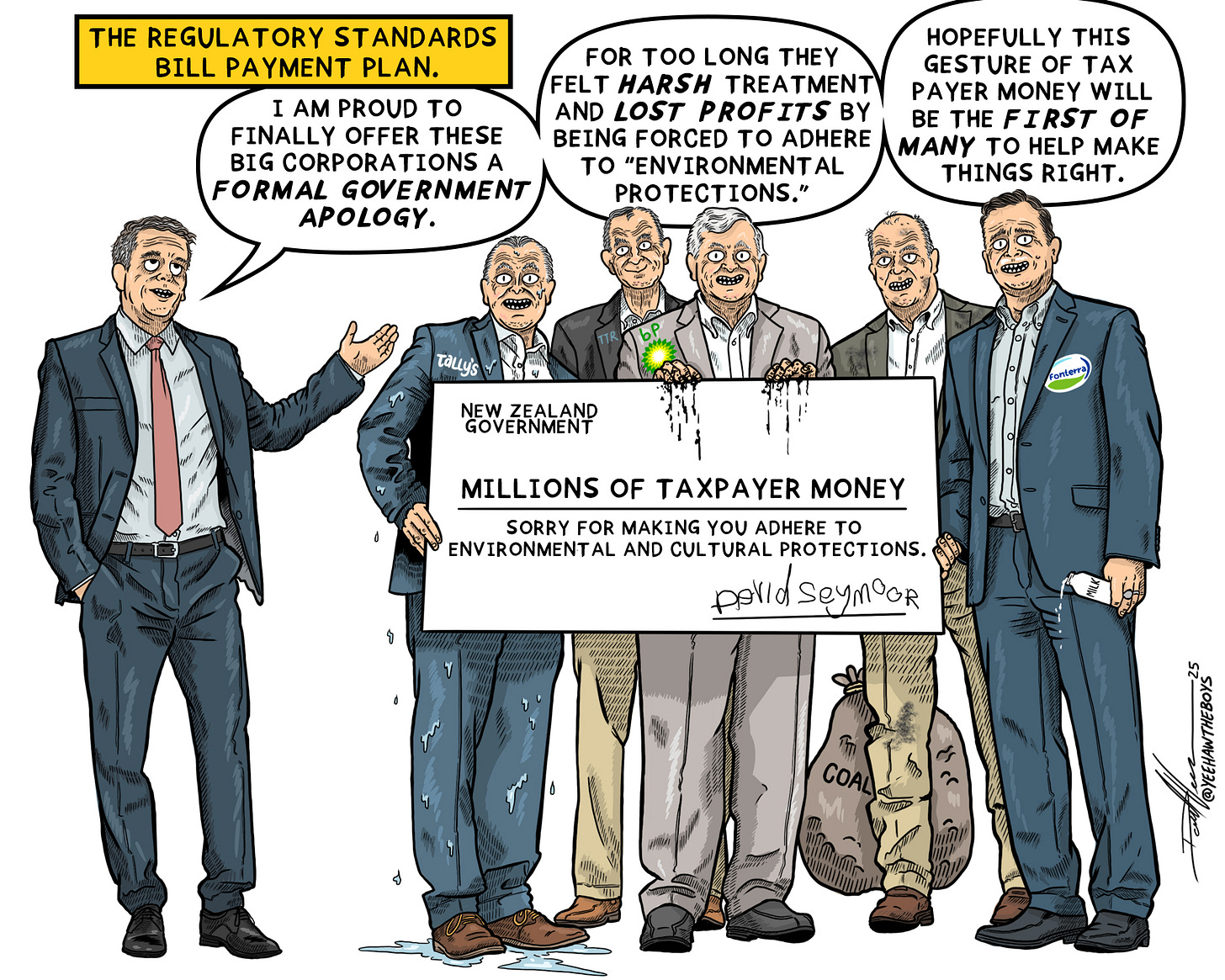A formal Government apology to our biggest polluters
How we could end up paying out big polluters for environmental protections
Behind The Panels
What’s this? More than one weekly post from y’boy? See what happens when you support the arts! (Please consider becoming a paid subscriber!)
This is the second of three comics commissioned by Greenpeace on the proposed Regulatory Standards Bill to help paint a picture of what the future could hold if the bill passes.
One of the core things that this bill proposes that may have drifted under the radar from all the other horrible things it wants to sneak in is that the government would be expected to pay out millions to corporations like Shell, Fonterra and Talleys just for trying to protect things like water, climate, air, oceans or native species.
There’s a possibility these large corporations, which contribute so much damage to the environment, could end up with the power to sue the government for implementing environmental protections.
Greenpeace explains this pretty simply: the bill essentially proposes to reverse the polluter pays principle back onto the government. The bill creates an expectation that if governments act in the public interest, they would have to pay out corporations whose “property rights” are affected. In short, corporations could demand compensation any time the government tries to protect people or the planet. For example:
Fonterra could demand payouts if a government moved to protect drinking water from dairy pollution.
Shell could claim compensation if rules were strengthened to prevent catastrophic oil spills.
Forestry companies could seek payouts if new laws aimed to prevent worker deaths or flooding and erosion/slash disasters on the East Coast.
Supermarket giants could expect compensation if rules were introduced to break up the duopoly and lower grocery prices.
Big Tobacco could demand payouts if stronger laws were passed to achieve a smoke-free NZ.
As Dame Anne Salmond succinctly put it, the bill is “inimical to the very idea of democracy as government ‘of the people, by the people, for the people,’ in which governments are supposed to serve the interests of citizens, not of capital or corporations.”
The bill aims to create a complex set of bureaucratic hurdles that make it hard to pass any law in the public interest, so even if we vote in a new governement, this will be incredibly hard to reverse and would make it even harder for future governments to impliment change on environmental, and cost of living issues that our country is already in the throws of.
Put plainly, corporations and private land owners should not be given the keys to the kingdom, should not be in charge of our country, and definitely not receive payouts for actively damaging our natural resources.
We don’t want to end up like the States, despite how much Seymour seems to want to push us in that direction. So if you have the time, and haven’t done so already, please consider making a submission against this bill.
Here are some useful links if you want to learn more and for help on how to submit.
Dame Anne Salmond’s summary of the main points, and its overall un democratic process.
How the Regulatory Standards bill trojan horses the treaty Principles Bill.
Greenpeace has a simple breakdown on the history of the bill and the impacts it will have on the environment.
Most importantly, here is a guide on how to make a submission against the bill, more useful links, key points to make, and where to submit it.
If you liked this comic, the write-ups, and mahi, and want to support, consider becoming a paid subscriber to this Substack! I offer weekly political comics as well as original non-political comics exclusively for paid subscribers. You can hear the full pitch here.
Or check out my store, which features prints of some of my classic comics and my latest book, Slices of Heaven: Uniquely Kiwi Comics about Aotearoa! It’s a print collection of warm and witty comics about the DNA of Aotearoa, celebrating our quirks, institutions, identity, and shared experiences.






